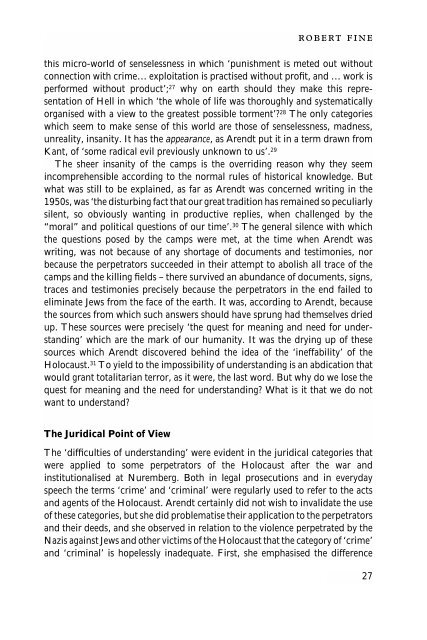Create successful ePaper yourself
Turn your PDF publications into a flip-book with our unique Google optimized e-Paper software.
this micro-world of senselessness in which ‘punishment is meted out without<br />
connection with crime… exploitation is practised without profit, and … work is<br />
performed without product’; 27 why on earth should <strong>the</strong>y make this representation<br />
of Hell in which ‘<strong>the</strong> whole of life was thoroughly and systematically<br />
organised with a view to <strong>the</strong> greatest possible torment’? 28 The only categories<br />
which seem to make sense of this world are those of senselessness, madness,<br />
unreality, insanity. It has <strong>the</strong> appearance, as Arendt put it in a term drawn from<br />
Kant, of ‘some radical evil previously unknown to us’. 29<br />
The sheer insanity of <strong>the</strong> camps is <strong>the</strong> overriding reason why <strong>the</strong>y seem<br />
incomprehensible according to <strong>the</strong> normal rules of historical knowledge. But<br />
what was still to be explained, as far as Arendt was concerned writing in <strong>the</strong><br />
1950s, was ‘<strong>the</strong> disturbing fact that our great tradition has remained so peculiarly<br />
silent, so obviously wanting in productive replies, when challenged by <strong>the</strong><br />
“moral” and political questions of our time’. 30 The general silence with which<br />
<strong>the</strong> questions posed by <strong>the</strong> camps were met, at <strong>the</strong> time when Arendt was<br />
writing, was not because of any shortage of documents and testimonies, nor<br />
because <strong>the</strong> perpetrators succeeded in <strong>the</strong>ir attempt to abolish all trace of <strong>the</strong><br />
camps and <strong>the</strong> killing fields – <strong>the</strong>re survived an abundance of documents, signs,<br />
traces and testimonies precisely because <strong>the</strong> perpetrators in <strong>the</strong> end failed to<br />
eliminate Jews from <strong>the</strong> face of <strong>the</strong> earth. It was, according to Arendt, because<br />
<strong>the</strong> sources from which such answers should have sprung had <strong>the</strong>mselves dried<br />
up. These sources were precisely ‘<strong>the</strong> quest for meaning and need for understanding’<br />
which are <strong>the</strong> mark of our humanity. It was <strong>the</strong> drying up of <strong>the</strong>se<br />
sources which Arendt discovered behind <strong>the</strong> idea of <strong>the</strong> ‘ineffability’ of <strong>the</strong><br />
<strong>Holocaust</strong>. 31 To yield to <strong>the</strong> impossibility of understanding is an abdication that<br />
would grant totalitarian terror, as it were, <strong>the</strong> last word. But why do we lose <strong>the</strong><br />
quest for meaning and <strong>the</strong> need for understanding? What is it that we do not<br />
want to understand?<br />
The Juridical Point of View<br />
robert fine<br />
The ‘difficulties of understanding’ were evident in <strong>the</strong> juridical categories that<br />
were applied to some perpetrators of <strong>the</strong> <strong>Holocaust</strong> after <strong>the</strong> war and<br />
institutionalised at Nuremberg. Both in legal prosecutions and in everyday<br />
speech <strong>the</strong> terms ‘crime’ and ‘criminal’ were regularly used to refer to <strong>the</strong> acts<br />
and agents of <strong>the</strong> <strong>Holocaust</strong>. Arendt certainly did not wish to invalidate <strong>the</strong> use<br />
of <strong>the</strong>se categories, but she did problematise <strong>the</strong>ir application to <strong>the</strong> perpetrators<br />
and <strong>the</strong>ir deeds, and she observed in relation to <strong>the</strong> violence perpetrated by <strong>the</strong><br />
Nazis against Jews and o<strong>the</strong>r victims of <strong>the</strong> <strong>Holocaust</strong> that <strong>the</strong> category of ‘crime’<br />
and ‘criminal’ is hopelessly inadequate. First, she emphasised <strong>the</strong> difference<br />
27

















